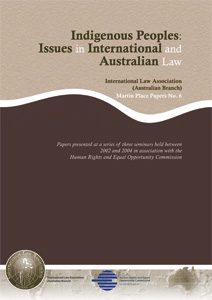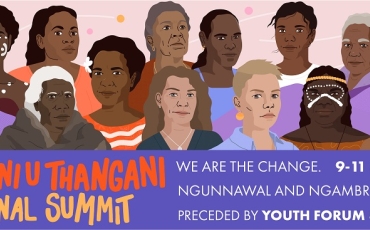Indigenous Peoples: Issues in International and Domestic Law
Indigenous Peoples:
Issues in International and Australian Law.
Martin Place Papers No. 6, 2007
International Law Association
(Australian Branch)
Papers presented at a series of three seminars held between 2002 and 2004 in association with the Human Rights and Equal Opportunity Commission.
Edited by Greg Marks.
ISSN 0728-7445
- Download PDF (900 kb)
TABLE OF CONTENTS
About the International Law Association
FOREWORD
PREFACE
SEMINAR ONE: A NATIONAL TREATY WITH INDIGENOUS AUSTRALIANS – THE INTERNATIONAL LAW PERSPECTIVE
- Dr William Jonas - Native Title and the Treaty Dialogue
- Professor Ivan Shearer - A Treaty between the Aboriginal Peoples of Australia and the Government of Australia from an International Law Perspective
- The Hon John von Doussa - Introductory remarks
- Dr William Jonas AM - The Recognition of Aboriginal Customary Law
- Megan Davis - The Recognition of Aboriginal Customary Law and International Law developments.
SEMINAR THREE – INDIGENOUS PEOPLES AND SOVEREIGNTY
- Greg Marks - Introductory remarks
- Tom Calma - Indigenous peoples and the right to self-determination
- David Ritter - The Return of the Zombie: Terra Nullius in 2004
Foreword
I am pleased to be able to introduce these papers on an enduringly important topic for all Australians.
It is also pleasing that this publication marks the continuation of the Martin Place Papers series after a pause of several years. The series was the brainchild of the late Professor David Johnson, then Challis Professor of International Law, University of Sydney. It serves to preserve occasional papers on a variety of topics, presented at meetings sponsored by the Australian Branch of the International Law Association, which might otherwise not be published, at least not in the form in which they were presented.
Mr Greg Marks is to be congratulated on collecting and editing the papers that follow. He was also responsible for instigating the seminars at which they were presented. His leadership in matters concerning indigenous rights in national and international law has been appropriately recognised in his election, at the Biennial Conference of the International Law Association, held in Toronto, Canada, in June 2006 to the position of Rapporteur of the Committee on the Rights of Indigenous Peoples.
Ivan Shearer
President, Australian Branch,
International Law Association 14 August 2006
Preface
The accommodation of rights and interests between the Indigenous inhabitants of Australia, the Aboriginal and Torres Strait Islander peoples, and the descendants of the European and other settlers, remains a priority concern for the Australian legal and political system.
The rights of Indigenous peoples have been recognised in international law and practice. Since international law has significant force in the Australian legal framework, it is clear that international norms, particularly those concerning human rights, are highly relevant to the legal and political situation of Australia’s Indigenous peoples. Since World War II Indigenous peoples around the world have increasingly turned to international forums for clarification, confirmation and development of their rights. This reflects in part the long standing refusal of Indigenous peoples to completely surrender their autonomy to the nation states in which they find themselves. It also reflects frustration on the part of Indigenous peoples at the intransigence of nation states in recognising on-going Indigenous autonomy in respect their lands and territories, resources, and law and custom.
Given the interrelation of domestic and international considerations in respect of Indigenous peoples, the Australian Branch of the International Law Association (ILA) has established an Indigenous Rights Committee. This Committee collaborated with the Human Rights and Equal Opportunity Commission (HREOC) to convene a series of three seminars on topics concerning the international law implications of Indigenous issues. The seminars covered the proposal for a treaty with Indigenous Australians, the role and recognition of customary Indigenous law, and the question of sovereignty. The support of the Human Rights and Equal Opportunity Commission in co-sponsoring the seminars is greatly appreciated
The papers presented at these seminars are brought together in this edition of the Martin Place Papers, an occasional series published by the ILA (Australian Branch). The papers are presented largely as delivered, rather than as formal academic articles. It is hoped that this approach will retain the directness and vitality of the presentations. It does mean, however, that the articles are not necessarily fully referenced nor consistent in citation systems.
The seminars, and the production of this Martin Place Paper, would not have been possible without the initiative and support of Margaret Brewster, President Emeritus of the Australian Branch of the ILA. Margaret saw the importance of bringing Indigenous rights within the focus of the ILA and has worked hard to achieve this. The current President, Professor Ivan Shearer, has fully supported this development, as well as presenting a paper at the first of the seminars.
Greg Marks
Convenor
Indigenous Rights Committee



